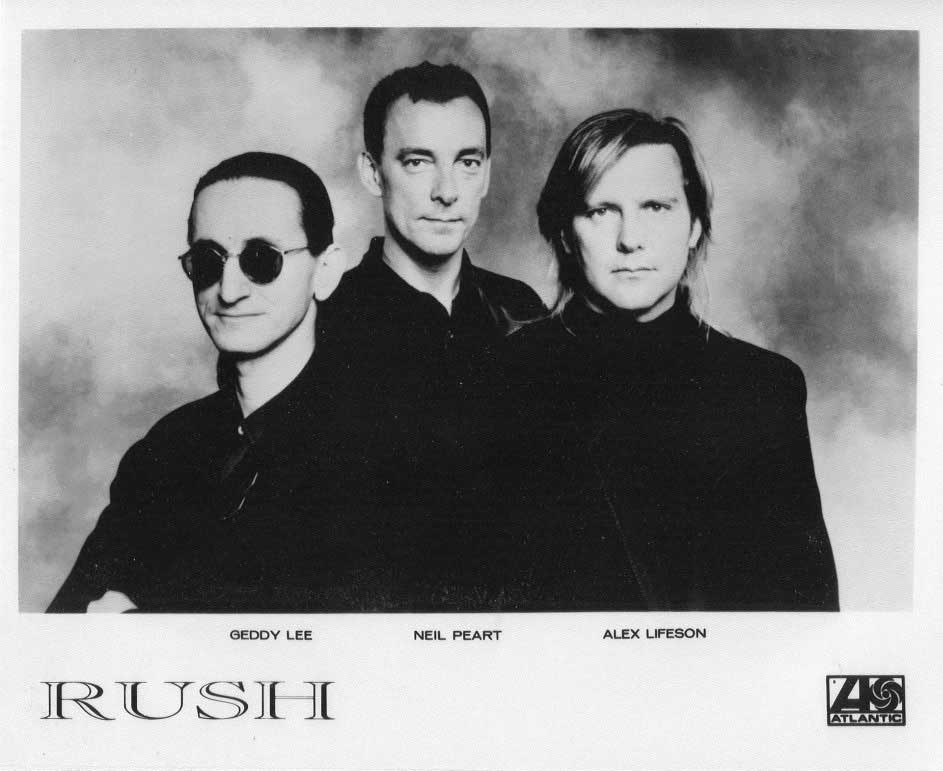Lasting Integrity
Rush's Stubborn Individualism Has Paid Off In The Long Run
By Bruce Britt, Los Angeles Times, April 12, 1990, transcribed by pwrwindows

This year, the Canadian hard-rock trio Rush celebrates 16 years of successful recording and touring. Rock veterans such as Kiss, Aerosmith and ZZ Top can make similar claims, but few bands have weathered rock 'n' roll's turbulence with as much style and integrity as Rush.
Consider the facts: While trends like disco, punk, new wave and dance pop threatened to undermine the band's popularity, Rush steadfastly refused to shift to rock's changing fashions or the whims of the band's mostly teenage audience. The band's music has always been an artful tapestry of complex rhythms, pop melody and literate lyrics.
Indeed, how many other hard-rock bands can claim to have written a song like Rush's "Distant Early Warning," which concerns U.S. radar installations strung along Canada's arctic region? How many other pop acts get song themes from books by Ayn Rand and Adam Smith?
Very few, for sure. Rush has shown a disregard for the conventional marketing wisdom that says teens and young adults are lusty, party-mad imbeciles. If the band has enjoyed fairly consistent commercial success, its rugged individualism has proved costly in one regard: Critics have been slow to give Rush its due.
Reviews for the band's new Atlantic Records album, Presto, are marked by a resentful tone; one can almost hear the gnash of teeth as critics admit the album is good.
Drummer/lyricist Neil Peart - who co-writes all of Rush's songs along with bassist Geddy Lee and guitarist Alex Lifeson - finds the grudging respect amusing.
"It's fulfilling to us, especially the cases involving critics that have slagged us over the years," Peart said. "I think critics are insecure by nature, and it's hard for them to recant. So when they actually have the conscience to say, 'It's not so bad after all,' it's kind of gratifying.
"The whole phenomenon of rock critics fascinates me, because they aren't really critics. They're not like literary or classical music critics, where a great knowledge of the subject is required. A lot of rock critics don't comment on the sound of the music, because they're not aware of those things."
Peart is philosophical as to why Rush has endured so long in the fickle world of rock.
"No one really knows these things, but I like to think it's our sincerity," Peart said. "I feel very fortunate that we have spanned this particular time period, stretching the boundaries of what a three-piece band can do."
Presto, like most of its predecessors, is another epic Rush production. Produced by Rupert Hine, the album's themes run from rumor-mongering ("Show Don't Tell") to the sad consequences of the reckless rock 'n' roll lifestyle ("Superconductor").
Peart said Presto is more guitar-oriented than most of the band's recent efforts - a surprising assertion, considering producer Hine earned his sterling reputation working with synth-pop acts such as the Fixx and Howard Jones.
"It's so easy to sit around the keyboard, and fit the guitars around that synthesized frame," Peart said. "This time we wanted to do something different. We encountered Rupert at a similar stage of his life. He was tired of working with machine-pop bands and was ready to make an organic record."
Peart said "Superconductor" was intended as an elegy to rock stars who died upholding the myth of rock 'n' roll rebelliousness.
"I wanted it to be statement about the Janis Joplins, the Jimi Hendrixes - the most obvious victims of the star machinery," Peart explained.
"It's a statement about the manipulators, too - the people who maintain this myth that you can have this wild lifestyle and remain balanced. Elvis Presley was a false image, and he was destroyed."
Hailing from Toronto, Rush emerged on the rock scene in 1974 with an album of standard hard-rock fare. The band's music changed in 1975, when Peart replaced drummer John Rutsey. With Peart writing the band's lyrics, Rush's songs became increasingly eloquent.
The band's first two albums with Peart - Fly by Night and Caress of Steel - sold poorly. According to the drummer-lyricist, executives at Rush's former record company, Mercury, advised the band to commercialize its sound.
"We were trying to find our sound, and those first albums were very schizoid," Peart explained. "They were not particularly successful, and the record company had already written us off its financial statements for the following year. We decided if our next album was to be our last, we were going to do whatever we wanted musically."
The record that resulted from that irreverent philosophy was 2112, Rush's breakthrough album. Supporting the album with almost ceaseless touring, Rush became a full-fledged arena attraction in 1976.
"2112 was a pivotal album because we had been asked to seek the mainstream," Peart said. "That album was a tremendous statement of abandon. Being a hit band didn't really matter as much to us as maintaining our integrity."
Rush's most remarkable coup occurred in the early to mid-1980s. The punk and new-wave rock movements, which placed passion and experimentation above virtuosity, made intricate rock styles like Rush's all but obsolete. Influenced by bands like the Police, Japan and Ultravox, Rush refashioned its sound, incorporating elements of world beat, synth-pop and other music.
"That entire movement forced us to re-evaluate our place in the whole music scene," Peart said. "It really made no sense to keep grinding out some formula when there was a whole new realm of influences to adopt and learn from. Minimalism, reggae and electronic pop had a profound impact on us. It was a great time to be around."